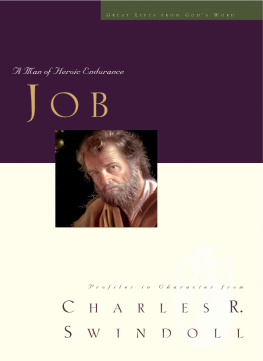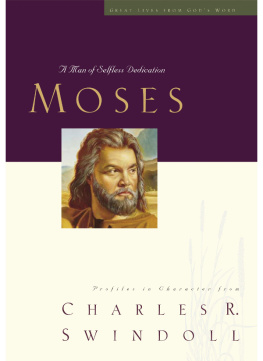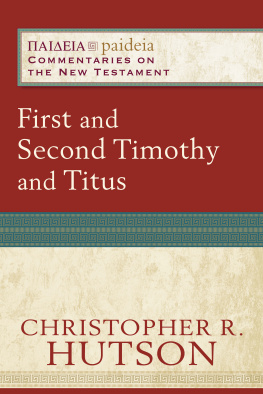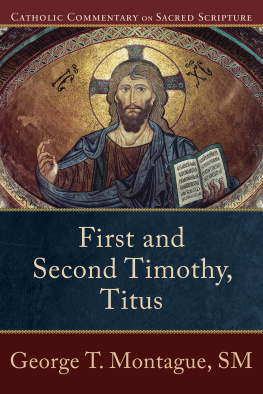Charles R. Swindoll - Insights on 1 & 2 Timothy, Titus
Here you can read online Charles R. Swindoll - Insights on 1 & 2 Timothy, Titus full text of the book (entire story) in english for free. Download pdf and epub, get meaning, cover and reviews about this ebook. year: 0, genre: Religion. Description of the work, (preface) as well as reviews are available. Best literature library LitArk.com created for fans of good reading and offers a wide selection of genres:
Romance novel
Science fiction
Adventure
Detective
Science
History
Home and family
Prose
Art
Politics
Computer
Non-fiction
Religion
Business
Children
Humor
Choose a favorite category and find really read worthwhile books. Enjoy immersion in the world of imagination, feel the emotions of the characters or learn something new for yourself, make an fascinating discovery.
- Book:Insights on 1 & 2 Timothy, Titus
- Author:
- Genre:
- Year:0
- Rating:3 / 5
- Favourites:Add to favourites
- Your mark:
- 60
- 1
- 2
- 3
- 4
- 5
Insights on 1 & 2 Timothy, Titus: summary, description and annotation
We offer to read an annotation, description, summary or preface (depends on what the author of the book "Insights on 1 & 2 Timothy, Titus" wrote himself). If you haven't found the necessary information about the book — write in the comments, we will try to find it.
Charles R. Swindoll: author's other books
Who wrote Insights on 1 & 2 Timothy, Titus? Find out the surname, the name of the author of the book and a list of all author's works by series.
Insights on 1 & 2 Timothy, Titus — read online for free the complete book (whole text) full work
Below is the text of the book, divided by pages. System saving the place of the last page read, allows you to conveniently read the book "Insights on 1 & 2 Timothy, Titus" online for free, without having to search again every time where you left off. Put a bookmark, and you can go to the page where you finished reading at any time.
Font size:
Interval:
Bookmark:
1Paul, an apostle of Christ Jesus according to the commandment of God our Savior, and of Christ Jesus, who is our hope,
2To Timothy, my true child in the faith: Grace, mercy and peace from God the Father and Christ Jesus our Lord.
3As I urged you upon my departure for Macedonia, remain on at Ephesus so that you may instruct certain men not to teach strange doctrines, 4nor to pay attention to myths and endless genealogies, which give rise to mere speculation rather than furthering the administration of God which is by faith. 5But the goal of our instruction is love from a pure heart and a good conscience and a sincere faith. 6For some men, straying from these things, have turned aside to fruitless discussion, 7wanting to be teachers of the Law, even though they do not understand either what they are saying or the matters about which they make confident assertions.
8But we know that the Law is good, if one uses it lawfully, 9realizing the fact that law is not made for a righteous person, but for those who are lawless and rebellious, for the ungodly and sinners, for the unholy and profane, for those who kill their fathers or mothers, for murderers 10and immoral men and homosexuals and kidnappers and liars and perjurers, and whatever else is contrary to sound teaching, 11according to the glorious gospel of the blessed God, with which I have been entrusted.
Of all of the vocations one might enter, Christian ministry would have to be the most confusing. For a person who finishes his or her medical school training, hanging out a shingle and practicing medicine is the logical next step. The details of running a practice can be overwhelming, but the mission remains clear. Everyone knows the job description of a physician: treat patients and help them stay healthy.
The same can be said of an attorney. Once law school is complete and the exacting bar exam passed, a lawyer uses his or her know-how to advise and represent clients in legal matters. A CPA earns a degree, passes a difficult exam, and then applies his or her expertise in the field of finance.
The job profile of a minister, however, isnt nearly so clear-cut. To enter ministry is to step into a milieu of high and lofty, yet utterly ambiguous expectations. A young minister might unwittingly step into the shoes of a legendary predecessor, which he can never hope to fill. Or, someone reared and trained in one part of the country follows Gods leading to another region, with just enough cultural differences to frustrate everyone Or, as occurs often, a church diligently seeks an expert in theology with years of pulpit experience, only to resist his spiritual leadership, criticize his temperament, and complain about his preaching once he arrives.
Then, theres the whole realm of theology. So many books and articles written, so many voices, so many alleged authorities with all sorts of perspectives on innumerable topics related to the church. The pastor is expected to be a walking encyclopedia of Bible knowledge, an expert on all the latest theological trends, a flawless public speaker, an inspiring executive leader, a servant-hearted shepherd, a gifted counselor, an authority on children and youth, a caretaker of the aged, sick, dying, and grievingas well as a dedicated husband and faithful family man!
With so many hats to wear, so many shoes to fill, so many expectations to meet and roles to play, a young pastor can forget why he entered the ministry in the first place. So, whats a pastor to do? Fortunately, the Holy Spirit inspired a remarkable servant of God to write a gifted pastor so that shepherds today might know for certain what the Lord expects of them, how other ministers can serve under his leadership, and how congregations may encourage and support all full-time vocational ministers.
The letter opens with a warm greeting from one close friend to another. A seasoned and scarred apostle, bearded and no doubt balding, writes as a man who understood the rigors of ministry. Nevertheless, Paul includes the title apostle, which might seem strange in a personal greeting to his closest associate. That would be like my signing a letter to one my sons:
Dad,
Senior Pastor
Paul inserts the title apostle for two reasons.
First, for the benefit of the church in Ephesus Paul writes to Timothy, intending every word to be heard by the churches in public readings Apostle describes someone sent to accomplish a task on behalf of a sender. And all first-century cultures recognized the same basic rule: treat an envoy as you would the sender, for that will determine how you are treated in return. God sent Paul, and Paul sent Timothy.
Second, for the benefit of Timothys confidence. Only here and in his greeting to Titus does Paul use the phrase according to the command of God (cf. Titus 1:3). Pauls authority to preach, teach, write, and lead came from Gods command, which he passed to Timothy upon sending him to Ephesus. This is not to suggest any sort of apostolic succession. Once the last of the apostles died, the title and authority of apostleship ended. Before the New Testament Scriptures had been collected and vetted by the churches, however, one depended on the recommendation of a trusted source before receiving anyones teaching as authentic.
Just as God had authorized Pauls ministry, so Timothy stood among the Ephesians with the same authority to teach and to lead.
Paul may have intended another benefit. It may have helped Timothy, a soldier in Gods army, feel less alone by reading the words of a comrade-in-arms. Unfortunately, ministry brings its share of loneliness, for a pastor especially. He dare not share too much of his life with any but the most trusted associates, and ideally they should be peers outside the church.
Pauls affection for Timothy as a pupil comes through in calling him my true child in the faith, similar to the apostles greeting to Titus (Titus 1:4). The phrase true child depends on the technical word gnsios, which, when used with child, distinguished a natural-born heir from an adoptee Pauls benediction also suggests an added affection. He frequently imparted grace and peace in his greetings, but to Timothy alone the apostle wishes for mercy (cf. 2 Tim. 1:2), a highly emotive word in Greek and the most common translation of the Hebrew term chesed, gracious, faithful love. Perhaps Paul recognized that Timothys tender disposition would cause him to need the Lords empathy while serving in the tumult of Ephesus.
After a relatively short greeting, Paul gets down to business. He offers his younger friend four specific directives, presumably in response to something specific Paul either has heard from Ephesus or knows about the city from his own experience.
First, stay at the task (1:3).
Paul urges Timothy to remain. The simple Greek verb meno means stay or remain, often used in the sense of take up residence. But Paul chooses prosmen, meaning wait or continue remaining. Furthermore, the Greek term for urged implies a strong exhortation Paul probably urged Timothy while they were together in Miletus, just before the apostle resumed his itinerary north to Troas and then over to Macedonia. He apparently received word that Timothy was struggling more than either of them had anticipated and so changes his travel plans to double back to Ephesus, promising Timothy he will arrive soon (3:1415; 4:13).
Sometimes a minister needs to recognize when the time has come to move on.
In 1965, I accepted a call to be the senior pastor of a church in Waltham, Massachusetts. As if the cultural mismatch of two native Texans in the land of Yankees didnt present challenge enough, my wife, Cynthia, could not adjust to the weather. To this day, shell tell you she didnt feel warm for two years.
Font size:
Interval:
Bookmark:
Similar books «Insights on 1 & 2 Timothy, Titus»
Look at similar books to Insights on 1 & 2 Timothy, Titus. We have selected literature similar in name and meaning in the hope of providing readers with more options to find new, interesting, not yet read works.
Discussion, reviews of the book Insights on 1 & 2 Timothy, Titus and just readers' own opinions. Leave your comments, write what you think about the work, its meaning or the main characters. Specify what exactly you liked and what you didn't like, and why you think so.















